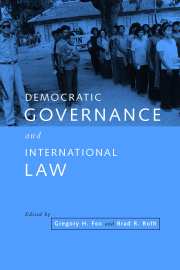Book contents
- Frontmatter
- Contents
- List of contributors
- List of acknowledgments
- Introduction: the spread of liberal democracy and its implications for international law
- PART I THE NORMATIVE FOUNDATIONS OF A RIGHT TO POLITICAL PARTICIPATION
- 1 Legitimacy and the democratic entitlement
- 2 The right to political participation in international law
- 3 Democracy and the body of international law
- PART II DEMOCRACY AND INTER-STATE RELATIONS
- PART III DEMOCRACY AND THE USE OF FORCE
- PART IV DEMOCRATIZATION AND CONFLICTING IMPERATIVES
- PART V CRITICAL APPROACHES
- Index
1 - Legitimacy and the democratic entitlement
Published online by Cambridge University Press: 04 May 2010
- Frontmatter
- Contents
- List of contributors
- List of acknowledgments
- Introduction: the spread of liberal democracy and its implications for international law
- PART I THE NORMATIVE FOUNDATIONS OF A RIGHT TO POLITICAL PARTICIPATION
- 1 Legitimacy and the democratic entitlement
- 2 The right to political participation in international law
- 3 Democracy and the body of international law
- PART II DEMOCRACY AND INTER-STATE RELATIONS
- PART III DEMOCRACY AND THE USE OF FORCE
- PART IV DEMOCRATIZATION AND CONFLICTING IMPERATIVES
- PART V CRITICAL APPROACHES
- Index
Summary
DEVELOPING OVERLAPPING CONSENSUS
In the world that emerged after the collapse of the Fascist and Communist ideologies, the principal cause of war has become unfairness and anomie. How the means of a good life are distributed among peoples and persons and whether people and persons are adequately consulted in the decisions that determine their life-prospects: these are the principal determinants of war and peace.
The role of the State, in an era of increasing transnationalization of big decisions and of the localization of subsidiary ones, is to serve as the forum for that organized social discourse, leading to a high degree of consensus regarding what is fair. That consensus is essential to the avoidance of war: in particular, civil war, the principal form of belligerence in the new era.
The most important instrument for developing overlapping consensus is the voting booth. Attention must therefore be paid to democracy as a right protected by international law and institutions. Democracy does not provide a guarantee against civil war. It merely provides the only known process by which a genuine social discourse can proceed among persons legitimately representing the spectrum of opinions and interests in a community or polis. Without it, there can be decisions. There can even be negotiation and discourse. But there can never be a genuine social convergence.
- Type
- Chapter
- Information
- Democratic Governance and International Law , pp. 25 - 47Publisher: Cambridge University PressPrint publication year: 2000
- 12
- Cited by



